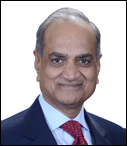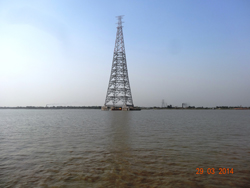 — Ramesh D. Chandak, MD & CEO, KEC International Ltd
— Ramesh D. Chandak, MD & CEO, KEC International Ltd
KEC International is a global infrastructure EPC major with a presence in diverse verticals like power transmission & distribution, cables, railways and, more recently, water. Ramesh D. Chandak shares valuable insights into the power transmission sector, an area where KEC has earned significant repute in both the domestic and international markets, with Venugopal Pillai.
What are the typical challenges faced during the erection of transmission lines?
The most common challenge is related to land acquisition and securing of right of way. Transmission lines span boundaries and obtaining land clearances for construction and erection is a major challenge. However, prompt help from collectors and local authorities does help in resolving issues locally.
There are also challenges related to climate and topography. Erection of transmission infrastructure can encounter difficulties on account of volatile and extreme climate conditions—for instance, snow and mountains in CIS regions and temperature exceeding 50 degrees centigrade in Middle East and sub-Saharan regions.
Unrest and hostile socio-political conditions in some regions could impact construction activity in that region.
In addition there are challenges related to the adoption of suitable construction methods. Like for example during the execution of one of our recent river crossing transmission line projects on Hooghly river in West Bengal that involved erection of four towers in mid-river as well as at the shore, on account of high wind velocity helicopters could not be used and instead specialised barges and cranes were used to build the 284m tower in mid river. Each tower weighed around 1,790 tonnes. This is probably the largest ever transmission line tower erected in India and its height is about 75 per cent of the height of Eiffel tower.
What is your view on existing procurement policies of state power transmission companies? Could you suggest measures to help state transcos make project implementation faster.
The time gap between bid and placing of the order is very long. Bid finalisation should happen within one week of bid opening. This will help in overall reduction of commodity and forex risk associated with the project and to that extent the project can be completed at lower cost.
What is your view on the impact of the entry of private companies as developers of transmission lines (independent power transmission companies) at both the intra-state and inter-regional levels?
Internationally, this is happening. This model has been operating successfully in Brazil and USA. It will be important for CEA to device strict discipline mechanism in regards construction through PPP model.
Do you think that India’s power transmission offers opportunities for contractors to graduate into developers of transmission lines?
 We perceive that EPC contracting and ownership of assets are two different models of doing business involving different strategies. EPC contracting is based on generating profit on the construction activities whereas PPP is the annuity business on the development of assets created. We feel that since the strengths of these two businesses are different there should be separate entities operating these businesses.
We perceive that EPC contracting and ownership of assets are two different models of doing business involving different strategies. EPC contracting is based on generating profit on the construction activities whereas PPP is the annuity business on the development of assets created. We feel that since the strengths of these two businesses are different there should be separate entities operating these businesses.
What is your view on overseas opportunities for Indian EPC contractors in the power transmission space? Which countries hold high potential?
Globally many countries are either underdeveloped or are in the developing stage and hence hold high growth potential. Also there is opportunity on account of replacement demand in the developed nations.
It is important for every major player in the country to have good experience of working in these foreign countries. This is also expected to provide good base for growth. Keeping this in mind, KEC’s operations are now spread across 50-plus countries and every year we continue to expand across news regions.
What is your expectation from the new Central government with respect to accelerating the pace of power transmission projects?
The new government’s initiative of integrating the related ministries like coal, power and renewable energy into one is definitely expected to improve the operational and procedural aspects in the power industry. On the ground level, things appear to be moving, however only time can tell the actual result. Every single move by the new government appears to be in the right direction. However, speed will matter the most.











